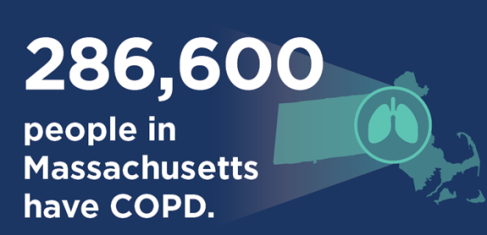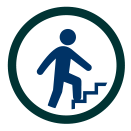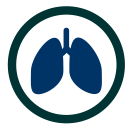Chronic Obstructive Pulmonary Disease (COPD) |
Chronic Obstructive Pulmonary Disease, or COPD, refers to a group of diseases including emphysema and chronic bronchitis, that block airflow and cause breathing-related problems. More than 15 million people have been diagnosed with COPD in the United States, but millions more may have COPD without knowing it.
In 2014, COPD was the third leading cause of death in the United States. In Massachusetts, COPD is consistently among the top ten reasons for hospital admission.
- Did You Know?
-
- COPD is the 3rd leading cause of death in the United States and causes serious, long-term disability
- COPD kills more than 135,000 Americans each year.
That's one death every 4 minutes - More than 15 million are told by a health care provider that they have COPD
Several additional millions likely have COPD and don't even know it
What is COPD?
- COPD refers to a group of chronic diseases, including emphysema and chronic bronchitis, which affect the flow of air in the lungs and make breathing difficult.
- COPD is a chronic lung disease that gets worse over time.
- Early detection of COPD is key to successful treatment.
- Symptoms Include:

|
| National Institute of Health: National Heart, Lung and Blood Institute, 2015 |

|
Constant coughing |

|
Shortness of breath |

|
Inability to breath easily |

|
Wheezing |

|
Excess mucus production |
To learn more about COPD and how to get tested click here.
What causes COPD?
Over time, exposure to irritants that damage your lungs and airways can cause COPD. The main cause of COPD is smoking, but nonsmokers can also get COPD.
- Approximately 85-90% of COPD diagnoses are attributed to cigarette smoking.
- Occupation exposures may account for another 15% of COPD diagnoses.
- A history of asthma may increase the risk of developing COPD.
- Long-term exposure to air pollution, secondhand smoke, dust, fumes and chemicals (which are often work-related) can cause COPD.
- Genetic predisposition can also increase the risk of COPD. Alpha-1 antitrypsin deficiency is a rare and inherited condition that affects the body’s ability to produce a protein that protects the lungs.
Why is the MA EPHT Program tracking COPD hospitalization?
Although the primary cause of COPD is smoking, an increasing number of studies have reported associations between indoor and outdoor air pollution exposures and COPD, suggesting that environmental exposure could be driving a large percentage of COPD cases.
COPD hospitalization measures will soon be available publicly on our website. They can be used to assess the burden of COPD, identify high-risk groups, and enhance prevention, education, and evaluation efforts. MA EPHT tracks emergency department visits and hospitalizations for COPD to better understand how rates of the disease change over time and differ based on geography, age and gender.
COPD hospitalization data are collected by the Massachusetts Center for Health Information and Analysis (CHIA) from all acute care hospitals and satellite emergency facilities in the state.
How can COPD be prevented?
According to the American Lung Association, COPD is often preventable and treatable. COPD may be prevented by:
- Encouraging tobacco cessation among current smokers.
- Discouraging teenagers and young adults from tobacco use.
- Reducing occupational exposure to dusts and chemicals, and other indoor and outdoor air pollutants.
- Early treatment and control of asthma may also lower risk in developing COPD.
